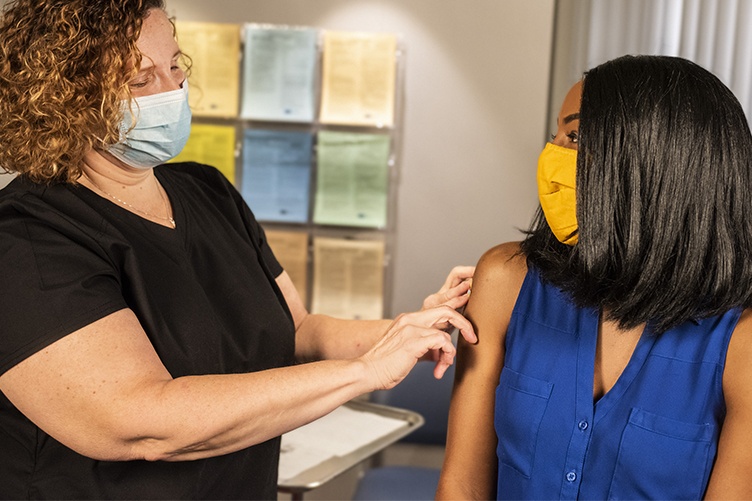
photo by Lauren Bishop, CDC
Vaccine hesitancy is not unique to COVID-19, say UNH researchers Rosemary Caron and Molly Dorsey. But there are some unique characteristics to hesitancy in America during the current pandemic. Understanding the history of vaccine administration can help contextualize current hesitancy and, when combined with effective public health practices, point to how the U.S. can more effectively manage the COVID-19 vaccine, they say.
Caron, professor of health management and policy, and Dorsey, associate professor of history, use their knowledge of history and health policy to provide perspective on America’s vaccine hesitant and recommendations for a path forward in their article, “Challenges, Inquiry and Recommendations: Effective COVID-19 Vaccine Management in the Face of Public Mistrust and Concern,” which appears in this month’s Frontiers in Communication.
Among the issues discussed is how, historically, vaccines have been associated with some rare but serious side effects, sometimes from vaccine production errors. Fears around side effects have prompted the spread of disinformation in the past, much as it has today, though not to the same degree. For some segments of the population, medical misconduct has been real and damaging, such as the Tuskegee syphilis study perpetrated on Black people. The researchers argue that the historical context provides a reasonable basis for some mistrust of medical science heading into the COVID-19 pandemic.
However, COVID-19 vaccines have their own unique set of circumstances that may exacerbate hesitancy, write Caron and Dorsey. The speed of vaccine development, the new techniques used in the mRNA vaccines, the questions that remain about the virus’s origin and the expectations that the vaccine be 100% effective are all complicating elements. The intense politicization of the vaccine has only added to hesitancy.
Given that vaccines have saved millions of lives and are key to public health, the researchers suggest ways that public health officials can approach the vaccine hesitant to allay their fears.
Among their recommendations are to undertake communications that respect the vaccine hesitant, that indicate clearly that information will evolve over time and that establish realistic expectations about what a vaccine can and cannot do. They also recommend lowering logistical barriers to receiving the vaccine and educating the public in the basics of public health.
The researchers write: “The public needs to be educated to understand…the health purpose for recommended actions that may limit one’s personal freedom to a small (e.g., mask-wearing) or large degree (e.g., COVID-19 vaccine mandate) in juxtaposition to the physical, mental, emotional and economic health of society.”
-
Written By:
Susan Dumais '88 '02G | College of Liberal Arts
















































